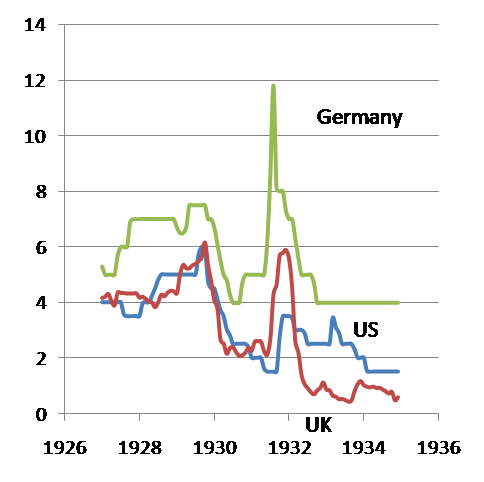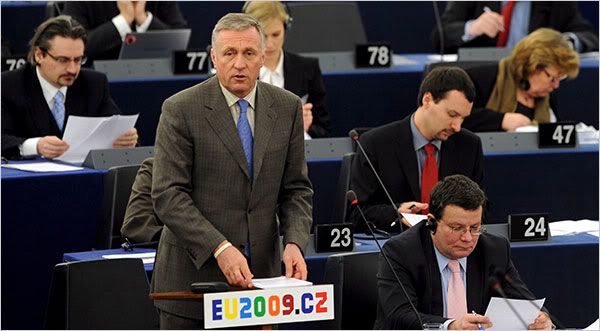Attempted DeLong smackdown meets It's a Dirty Rotten Job But Someone's Got to Do It.
Brad DeLong attempts to defend the Geithner plan. I consider this a good sign for the USA and a bad sign for Berkeley economics department economic history teaching. He is brilliant as always and almost convincing. I post some of his argument and all of my comment
Q: What is the Geithner Plan?
A: The Geithner Plan is a trillion-dollar operation by which the U.S. acts as the world's largest hedge fund investor, committing its money to funds to buy up risky and distressed but probably fundamentally undervalued assets and, as patient capital, holding them either until maturity or until markets recover so that risk discounts are normal and it can sell them off--in either case at an immense profit.
[snip]
Q: Why isn't this just a massive giveaway to yet another set of financiers?
A: The private managers put in $30 billion, but the Treasury puts in $150 billion--and so has 5/6 of the equity. When the private managers make $1, the Treasury makes $5. If we were investing in a normal hedge fund, we would have to pay the managers 2% of the capital and 20% of the profits every year; the Treasury is only paying 0% of the capital value and 17% of the profits every year.
We own the FDIC too so we are bearing 97% of the downside risk. Hedge fund investors can't end up with less than zero if the manager ends up with zero. This makes the analogy clearly false.
Second, the fact that hedge fund investors do it does not mean that it isn't essentially giving lots of money to already rich people in exchange for a chance to bear a lot of risk. You do not, in general, assume that investors are rational. You can't turn the efficient markets hypothesis on and off at will.
Finally, no one is willing to invest in someone's second hedge fund (well maybe someone is but it is dumb). If I have one hedge fund that is generating me income of 10 million a year and another one where I have limited risk, I might just take huge gambles with the second, to, you know, maximize the value of my option. If all my income comes from one fund, I won't be so casual about it becoming worthless. I think that hedge fund managers typically keep a lot of their wealth in their one fund too. The one example I know of LTCM was like that except for one manager who put more than all of his wealth in LTCM by borrowing to super duper leverage.
Investors can tell how much fund managers have taken out. I don't know anyone who invests in a hedge fund, but, I suspect, that if the manager takes a lot of money out of it, they switch funds.
The fact is that the Geithner deal will have highly positive expected returns for the private partners even if the expected returns on the investment are negative. Loss limited to 3% of the investment and gain equal to 17% of the gain is an extremely valuable Geithner put. This means that, if the private partners really are experts and know what assets are worth in expected value, they will pay more and the US government will have large expected losses.
If Geithner didn't want the USA to lose money, he could design the program so that hedge fund managers put of 3% of the capital and get, say, a 4% share. That way they would be willing to buy assets at 4/3 of their expected hold to maturity value *if* they were risk neutral, less since they are risk averse. This way I'd guess that they are willing to pay double their estimate of the expected hold to maturity value, because of the value of the Geithner put.
I admit that my guess has nothing to do with any calculation of the value of the option. I'm guessing that Geithner wants to buy toxic sludge at twice its hold to maturity value, because that is the only price at which banks are solvent -- that he wants to give banks the value of their toxic sludge but wants to pretend that he didn't do it on purpose. I am using the current market price as my estimate of the hold to maturity value. OK so I'm switching the efficient markets hypothesis off and on, but its the only estimate we have. I'd say there is a lot of wealth in the world and selling pressure can't keep assets undervalued for months.
The fact that CDOs are not being bought and sold doesn't mean that there is no one able to buy them because everyone is deleveraging. It has more to do with the fact that they are on balance sheets at values much higher than anyone is willing to pay. Current owners won't sell at the current market price, because they are not marking to the current market price not because they can't find buyers at the current market price.
Oh and adverse selection my ass. If I had a billion dollars, I could go to Goldman Sachs and say I want to buy 0.1% of your CDO proportional to your current portfolio. If you want to sell me some of them and not all of them, you can go to Geithner -- he's the one who wants to give you money. Doesn't seem to be happening does it ?
update: pulled back from comments
"The fact that CDOs are not being bought and sold doesn't mean that there is no one able to buy them because everyone is deleveraging. It has more to do with the fact that they are on balance sheets at values much higher than anyone is willing to pay. Current owners won't sell at the current market price, because they are not marking to the current market price not because they can't find buyers at the current market price."
You offer zero evidence for this proposition. You spend an enormous time on this blog arguing that markets are not efficient, but here insist on using the "market" price as a reasonable estimate of the net present value of the assets, even though there is no liquid market in these assets. You can offer hypotheses about why that is, but what we know is that the market doesn't exist right now. The vast majority of the "prices" that are being used for markdowns are fire-sale prices. It's absurd to think that the prices that distressed institutions are willing to sell at are real prices.
I'm glad you called this an "attempted smackdown," because it certainly doesn't succeed.
1:35 PM
Delete
Blogger Robert said...
I admitted to the inconsistency in my turning the efficient markets hypothesis on and off (and after accusing Brad of doing that).
On the substantive contested claim it is just not true that *everyone* is deleveraging. This is a fact, and I have evidence. Warren Buffet, for example, decided to pick up more exposure to Goldman Sachs. I don't need another example.
Brad's analysis is aggregate (he is a macroeconomist).
Now it has been alleged that no one is buying CDOs because the seller knows more about the CDO than the buyer so there is an adverse selection problem and there is an equilibrium of no trading except for fire sales.
I think this argument is based on an absurd assumption that all sales must be via market orders on double auction markets. There is no need for me to allow the seller to pick the lemons to sell me and keep the cherries. If I had the money, I could offer to buy 1% of a banks CDO book for, say 60% of face value. That is demand an equal fraction of all of their CDO's.
No one has done this. Banks are very eager to deleverage. Warren Buffet is buying -- something -- but not a part of any banks current CDO book. I think my explanation, for which you claim I present no evidence, is the only explanation which fits that fact, which I call evidence.

